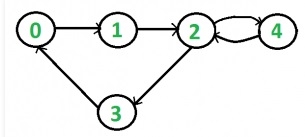
 Data Structure
Data Structure Networking
Networking RDBMS
RDBMS Operating System
Operating System Java
Java MS Excel
MS Excel iOS
iOS HTML
HTML CSS
CSS Android
Android Python
Python C Programming
C Programming C++
C++ C#
C# MongoDB
MongoDB MySQL
MySQL Javascript
Javascript PHP
PHP
- Selected Reading
- UPSC IAS Exams Notes
- Developer's Best Practices
- Questions and Answers
- Effective Resume Writing
- HR Interview Questions
- Computer Glossary
- Who is Who
C++ Program to Check the Connectivity of Directed Graph Using BFS
The Breadth-First Search (BFS) algorithm is a graph traversal algorithm that starts at the tree root and explores all nodes at the present depth before moving to the nodes at the next level. In this article, we will discuss how to check the connectivity of a directed graph using BFS traversal algorithm.
Understanding Connectivity of a Graph
A graph is said to be connected if there is a path between every pair of vertices. To check connectivity of a graph, we will try to traverse all nodes using any traversal algorithm. After completing the traversal, if there is any node, which is not visited, then the graph is not connected. To check this using BFS traversal,
- Start BFS traversal from any node (say node 0).
- Track visited vertices using a visited[] array.
- After BFS, if all vertices are visited, the graph is connected. And, if any vertex remains unvisited, the graph is disconnected.
Connectivity in Directed Graphs
In directed graphs, connectivity can be categorized as three types:
- Strongly Connected: Every vertex can reach every other vertex.
- Weakly Connected: There is a path between every pair of vertices and ignoring direction, the graph is connected.
- One-Way Connected (Reachability): Starting from node zero, there is a path to every other vertex.
Using BFS traversal algorithm, we can easily check one-way connectivity of directed graphs. First, we will try to traverse the graph using BFS traversal. If all vertices are visited, then the graph is one-way connected.
Example of a Connected Directed Graph
The image below shows an example of a connected directed graph.

Algorithm
- Step 1: Start
- Step 2: Input number of vertices V and number of edges E
- Step 3: Create an adjacency list for the directed graph
- Step 4: For each edge, input the pair of vertices (u, v) and add v to u's adjacency list
- Step 5: Initialize a visited array of size V with all values set to false
- Step 6: Initialize a queue for BFS traversal
- Step 7: Mark the starting node (vertex 0) as visited
- Step 8: Push the starting node into the queue
- Step 9: While the queue is not empty, repeat steps 10 to 12
- Step 10: Pop a vertex from the queue
- Step 11: For each adjacent vertex of the popped vertex, check if it is unvisited
- Step 12: If unvisited, mark it as visited and enqueue it
- Step 13: After BFS, check if all vertices are visited
- Step 14: If all are visited, the graph is connected from the starting node; otherwise, it is not connected
- Step 15: End
C++ Program to Check One-Way Connectivity of a Directed Graph
The following C++ program shows how to check the one-way connectivity of a directed graph using BFS. The program allows the user to input the number of vertices and edges, and then it displays whether the graph is connected from the starting node or not.
#include <iostream>
#include <vector>
#include <queue>
using namespace std;
// Function to add a directed edge from u to v
void addEdge(vector<int> adj[], int u, int v) {
adj[u].push_back(v);
}
// Function to check connectivity using BFS
bool isConnected(vector<int> adj[], int V) {
vector<bool> visited(V, false);
queue<int> q;
visited[0] = true;
q.push(0);
while (!q.empty()) {
int u = q.front();
q.pop();
for (int v : adj[u]) {
if (!visited[v]) {
visited[v] = true;
q.push(v);
}
}
}
// Check if all vertices are visited
for (bool v : visited) {
if (!v) return false;
}
return true;
}
int main() {
int V, E;
cout << "Enter number of vertices: ";
cin >> V;
cout << "Enter number of edges: ";
cin >> E;
vector<int> adj[V];
cout << "Enter directed edges (u v):\n";
for (int i = 0; i < E; ++i) {
int u, v;
cin >> u >> v;
addEdge(adj, u, v);
}
if (isConnected(adj, V))
cout << "The graph is connected from vertex 0.\n";
else
cout << "The graph is not connected from vertex 0.\n";
return 0;
}
Sample Input
Enter number of vertices: 4 Enter number of edges: 3 Enter directed edges (u v): 0 1 1 2 2 3
Sample Output
The graph is connected from vertex 0.

